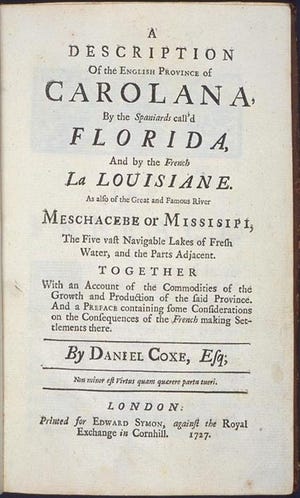
Speculators have been trying to lure settlers to Carolina Eden since Daniel Cox IV published “Description of the English Province of Carolina” in 1722. Cox carried the torch of his father, who 30 years earlier had “purchased a county patent” for “Carolana” – a deal from the Atlantic to the ocean Pacific – having abandoned a million acres in New Jersey.
In “Description,” Daniel IV proposed the formation of the United States – the first known proposal of this kind – apparently for the purpose of trade.
Daniel IV’s grandson, Tench Cox, delegate to the Continental Congress and later Assistant Secretary of the Treasury, is best known for proposing to industrialize the South. In the 1890s, Tench added hundreds of thousands of acres of western North Carolina to his portfolio.

Tench’s grandson, Colonel Frank Cox, continued the family’s interest in the area. He helped finance the North Carolina Western Railroad and purchased the Joseph McDowell Carson mansion on the Green River in Polk County.
We skip another two generations. Coxe’s heirs could not keep their estate, and it ended up, after some exchanges, in the hands of Dennis Palinskar. For a brief and poorly funded period in 1986-1987, Palenscar attempted to create a “fantasy island for southerners”.
In an article written by Tony Early for the Forest City Daily Courier, Balinscar’s executive assistant Claudia Hamrick said, “If you question anything in the sales meeting, particularly his (Balinskar) credibility or the project, he’s going to get very defensive. He’s always told us that if we don’t make the sale That would be a problem with our credibility.”
Paradise seekers purchased 58 lifetime memberships and RV park locations by December 1986, but the company’s checks began to bounce. Hamrick said Palnascar “often asked her to tell creditors that he was in Toledo visiting his sick mother when he was in the next room.” She said she “heard Palinskar tell a creditor that he was having trouble paying the bills because his employees stole cash and checks from him.”
This is the story of a bad dream. It is part of the story of upscale development in western North Carolina, which deserves its own literature. The writer of the Forest City essay, it turns out, is Tony Early, who became one of the most famous novelists in our country, author of Jim the Boy and Blue Star.
Soon after Palinskar’s fiasco, Elaine and Eugene Cantrell purchased Green River Ranch, and they have original restored and established a viable business of historic tours, bed and breakfasts and hosting special events. Green River Plantation is the crown jewel of a rural county that has suddenly become bejeweled.
Romantic, tragic, and epic stories like those surrounding Cox lie in every mountain development. One of the other more famous examples—as judged by its place in literature—is the development of Beaverdam Road, home of the late great author Wilma Dickman, in North Asheville.
In the preface to her 1974 issue of her classic record The French Broad, Dickman wrote: “Companies catering to the leisure, resort, and leisure demands of a restless urban audience… are amassing important mountain empires and ‘evolving’ them at an astonishing rate…it seems to be It is becoming increasingly clear that the development of a basic philosophy for the use of resources … is long overdue.”
Dykeman also put the stories of her development into unforgettable fiction: Lydia McQueen restoring the spring in her home in The Tall Woman, and Clay Thurston, the construction worker who is the protagonist of The Far Family, driving off the edge of a winding mountain road like the one that descends from Blue Ridge Parkway in Elk Mountain.

Rob Neufeld wrote the local history feature “Visiting Our Past” for Citizen Times until his death in 2019. This column was originally published on May 14, 2008.



